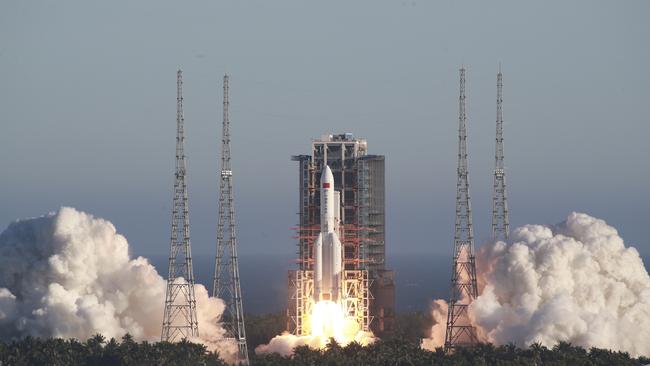China launches new rocket in space race with US
China has announced a big advance in its space program, with the launch of its most advanced rocket.

China has announced a big advance in its space program, with the launch of its most advanced rocket and tests of a crew capsule for lunar and space station missions.
Long March 5B — a 53m, 849-tonne rocket — lit its main engines and climbed into space from the Wenchang Space Launch Centre on the southern island of Hainan on Tuesday.
“The maiden flight achieved full success, marking the first battle victory to operate a space station and heralding the new phase of our country’s manned space program,” the China Manned Space office said.
The payload separated from the rocket eight minutes after lift-off and entered its “predetermined orbit”, the office said.
The Long March 5B and cargo and crew vehicle are the cornerstone of Beijing’s plans to construct a manned space station within two years and launch its first manned mission to the moon by 2030.
“The success of its maiden flight laid an important foundation to the building of the space station,” the Chinese space office said.
The unmanned rocket carried test models of the capsule, which can accommodate six crew, and a soft, inflated cargo return capsule.
The test flight is a considerable boost for the Chinese space program after two other rockets, the 7A model and Long March 3B, failed to carry satellites into space this year.
China has made big strides in the past decade to catch up with the US, as it strives to elevate its status as a space superpower.
The US is due to send its first new US-designed crew vehicle in almost four decades on a maiden flight to the International Space Station before the end of this month. NASA has also announced plans to return astronauts to the moon in 2024 and mount the first manned mission to Mars by 2040.
China first launched its own astronauts, or taikonauts, in 2003, but has not launched any crewed missions since 2016. In January last year, China became the first nation to land a rover on the far side of the moon. The vehicle has driven 450m so far.
Beijing plans to complete the construction of a 100-tonne, three-person space station named Tianhe, or Harmony of the Heavens, within two years and send the first taikonauts to the moon within a decade.
“The main goal of the space station is to turn our country into one that independently has the abilities to fly astronauts in the near-Earth space, to carry out manned, near-Earth scientific experiments, and to exploit space resources,” said Zhou Jianping, chief designer of the country’s manned space program. China also plans to use a Long March 5 for a Mars rover mission in July.
In its latest report, the US’s China Economic and Security Review Commission noted: “If plans hold to launch its first long-term space station module in 2020, it will have matched the United States’ nearly 40-year progression from first human spaceflight to first space station module in less than 20 years.”
The Times


